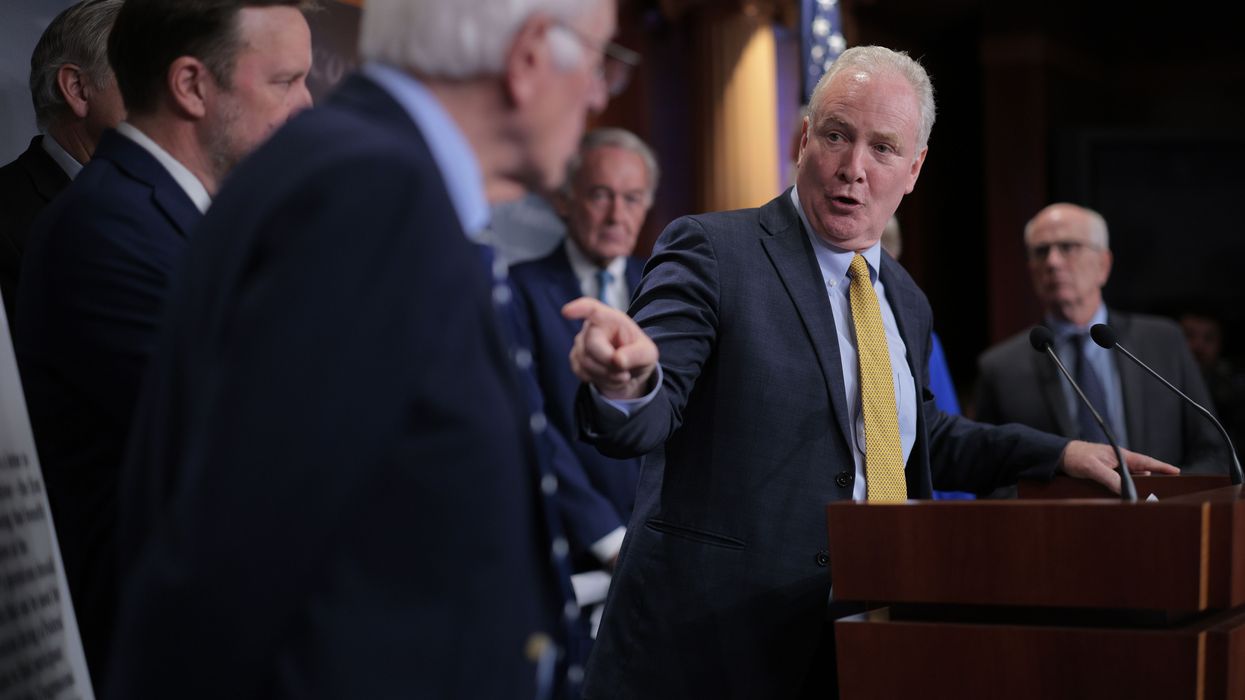December, 20 2022, 10:18am EDT

New Truck Standard Falls Short of What's Needed to Protect Communities from Pollution
Statement by Dave Cooke, Senior Vehicles Analyst, Union of Concerned Scientists
WASHINGTON
Today, the U.S. Environmental Protection Agency released a new rule to limit pollution from new heavy-duty trucks. The rule is the first update to standards regulating smog-forming and soot pollution from heavy-duty trucks in over two decades. EPA's final rule applies to truck sales in all 50 states and comes on the heels of standards set in 2020 by California and subsequently adopted by several states. However, the rule doesn't answer the calls from scientists and environmental justice advocates to speed the transition to zero-emission trucks, which EPA has signaled will be considered in their next round of standards expected next year.
Below is a statement by Dave Cooke, senior vehicles analyst for the Clean Transportation Program at the Union of Concerned Scientists.
"The emissions from heavy-duty trucks pose a clear threat to the millions of people who live near major highways and trucking corridors--disproportionately people of color and low-income communities. Nearly 8,000 people each year are estimated to die prematurely as a result of exposure to truck pollution. National pollution standards for heavy-duty trucks are a vital, proven tool for cutting harmful diesel emissions, and these standards were last updated 20 years ago.
"While new trucks will emit significantly less pollution under the new standard compared to today's vehicles, this policy is a missed opportunity. The final standards announced by EPA do not reflect the full potential of the solutions available to tackle smog-forming and particulate pollution from trucks, including electrification. Many states already have rules in place that effectively reduce pollution and advance truck electrification--rules that are more ambitious than what EPA has put forth.
"The EPA has an obligation to listen to the people who are breathing this pollution every day. The agency must set standards that substantially reduce pollution while also putting us on a path to zero emissions. This rule is limited in scope, leaving significant work to be done to address the public health challenge and environmental injustice posed by truck pollution. Fortunately, EPA is set to develop another round of truck standards next year. Those standards must address the multiple pollutants produced by diesel engines and propel a shift to zero-emission trucks. Communities on the front lines of truck pollution can't afford to wait any longer."
The Union of Concerned Scientists is the leading science-based nonprofit working for a healthy environment and a safer world. UCS combines independent scientific research and citizen action to develop innovative, practical solutions and to secure responsible changes in government policy, corporate practices, and consumer choices.
LATEST NEWS
Maduro Vows Venezuela Will Be a 'Colony Never Again' as Trump Intensifies Threats
He has described President Donald Trump's push for regime change as a "colonial threat" to "seize" Venezuela's oil.
Dec 02, 2025
Venezuelan President Nicolás Maduro remained defiant on Monday as US President Donald Trump plotted "next steps" against the South American nation with top national security brass.
Before thousands of Venezuelans at a rally in Caracas, the nation’s embattled president said he would not accept peace on US terms unless it came “with sovereignty, equality, and freedom.”
“We do not want a slave’s peace, nor the peace of colonies! Colony, never! Slaves, never!” he said.
The speech came days after Trump announced that the US would close Venezuelan airspace, which many interpreted as a final step before a series of strikes on the mainland.
The US has framed its military buildup in the Southern Caribbean as part of a campaign to stop drug smuggling, the same justification it has used to carry out the extrajudicial bombings of more than 20 boats in the region—which have killed at least 83 people—while disclosing zero proof of the victims' involvement with drug trafficking.
Trump has also accused Maduro of being the leader of the so-called "Cartel de los Soles," which he slapped with the label of “Foreign Terrorist Organization” last month, even though it is not an "organization" at all, but a media shorthand to refer to alleged connections between Venezuelan leaders and the drug trade.
Meanwhile, both US and international assessments have found that Venezuela is but a minor player in the global drug trade.
The US has amassed more than 15,000 troops outside Venezuela, the most it's sent to the region since 1989, when the administration of former President George H.W. Bush launched a land invasion of Panama to overthrow its drug-running dictator Manuel Noriega. Documents obtained by The Intercept last week suggested that the US seeks to maintain "a massive military presence in the Caribbean" for years to come.
"By a factor of at least 10, the US presence is too great for even an intensified anti-drug operation," wrote US national editor Edward Luce in the Financial Times on Tuesday.
Trump's motive for stopping drug trafficking was further called into question after he pardoned former Honduran President Juan Orlando Hernández, a onetime US ally who was sentenced last year to 45 years in prison for helping to traffic at least 400 tons of cocaine to the US. The pardon was issued as part of Trump's efforts to influence Honduras' upcoming election to secure the victory of right-wing candidate Nasry “Tito” Asfura.
The goal of regime change was essentially confirmed on Monday when Reuters reported that Trump had offered Maduro safe passage out of Venezuela if he were willing to abdicate power during a phone call on November 21.
“You can save yourself and those closest to you, but you must leave the country now,” Trump reportedly told Maduro.
Maduro reportedly said he'd be willing to accept the offer if his family members were granted complete amnesty and the US removed sanctions against them, as well as over 100 other Venezuelan officials. He also asked for the case against him before the International Criminal Court (ICC) to be dropped.
Trump rejected that deal, and his offer of safe passage expired on Friday, the day before the US announced it had closed Venezuelan airspace. Trump confirmed to the press on Sunday that the talks had happened, but provided few additional details.
Maduro has categorically denied involvement with drug trafficking and has portrayed the White House's sabre-rattling as a "colonial threat." Last week, while brandishing the sword of South American anticolonial hero Simón Bolívar, he pledged that Venezuela would be a "colony never again."
On Sunday, he accused Trump of trying to "seize" the nation's oil reserves. He has called for the Organization of the Petroleum Exporting Countries (OPEC) to step in to help the country counter what he said were “growing and illegal threats” from Trump.
Venezuela has the world’s largest proven oil reserves—about a fifth of the Earth’s total, and more than Iraq had at the time of the George W. Bush administration's 2003 invasion. However, US sanctions against Venezuela largely block American oil companies from accessing the reserves, which are controlled by the nation’s state-owned oil company Petróleos de Venezuela. These sanctions, which have limited Venezuela's ability to export its most valuable natural resource, are considered one of the primary reasons for the nation's economic instability in recent years.
While at a rally in 2023, Trump said he regretted not having "taken [Venezuela] over" during his first term. "We would have gotten to all that oil; it would have been right next door,” he said.
"We’ve seen this tragic play before," wrote Richard Steiner, a former marine professor with the University of Alaska, this weekend in Common Dreams. "The Bush administration justified its disastrous 2003 invasion of Iraq with the pretext that Iraq had weapons of mass destruction, which, as it turned out, it didn’t. And as US Central Command commander General John Abizaid admitted about the Iraq war at the time: 'Of course it’s about oil, it’s very much about oil, and we can’t really deny that.'"
"A similar pretext—this time 'drug interdiction'—is being used to justify a potential US invasion and regime change in Venezuela," he continued. "But this is not about stopping the flow of dangerous drugs, it is about actually increasing the flow of the dangerous drug some pushers want to keep us all hooked on—oil."
Keep ReadingShow Less
‘We Must Stop Tinkering Around the Edges’: Van Hollen Makes Case for Medicare for All Amid ACA Fight
"Yes, let's extend the ACA tax credits to prevent a huge spike in healthcare costs for millions," said Sen. Chris Van Hollen. "Then, let's finally create a system that puts your health over corporate profits."
Dec 02, 2025
Democratic US Sen. Chris Van Hollen on Monday became the latest lawmaker to champion Medicare for All as the best solution to the country's healthcare woes as tens of millions of Americans face soaring private insurance premiums.
In a social media post, Van Hollen (D-Md.) said that "we must stop tinkering around the edges of a broken healthcare system," pointing to massive administrative costs and poor health outcomes under the for-profit status quo.
"Yes, let's extend the [Affordable Care Act] tax credits to prevent a huge spike in healthcare costs for millions," said Van Hollen. "Then, let's finally create a system that puts your health over corporate profits. We need Medicare for All."
We must stop tinkering around the edges of a broken healthcare system.
Yes, let's extend the ACA tax credits to prevent a huge spike in healthcare costs for millions. Then, let's finally create a system that puts your health over corporate profits.
We need Medicare for All. pic.twitter.com/lszdO1vw2u
— Senator Chris Van Hollen (@ChrisVanHollen) December 1, 2025
Van Hollen's remarks came as lawmakers continued to negotiate a possible deal to extend enhanced ACA subsidies that are set to lapse at the end of the year, an outcome that would further drive up healthcare costs for millions.
Politico reported late Monday that most senators "believe the chances for a bipartisan breakthrough" before a planned vote next week "are roughly zero."
"Instead, the most likely outcome is that Senate Democrats put up a bill that has little GOP support for a vote, if any, while Republicans offer a competing bill of their own," the outlet noted. "And even those partisan proposals remained in flux as lawmakers returned to Washington from a weeklong recess."
Neither side of the negotiations is offering much more than a Band-Aid on a gaping wound. Democratic leaders want a clean extension of the subsidies to avert catastrophic cost increases, while President Donald Trump and Republican lawmakers are demanding new restrictions on the ACA that would make the system worse.
A handful of progressive lawmakers have used the worsening US healthcare crisis to make the case for a fundamental overhaul, one that would replace the for-profit model with a Medicare for All system that guarantees coverage to everyone for free at the point of service—and at a lower overall cost than the current system.
Van Hollen is the newest Senate cosponsor of the Medicare for All Act, formally backing the legislation led by Sen. Bernie Sanders (I-Vt.) just last month.
Rep. Pramila Jayapal (D-Wash.), the lead sponsor of the Medicare for All Act in the House, expressed "100%" agreement with Van Hollen's Monday post.
"Thank you, Chris Van Hollen!" Jayapal wrote.
Keep ReadingShow Less
'Furious Backlash' Inside Pentagon as Hegseth Seeks to Avoid Blame for Deadly War Crimes
"This is murder," said one legal expert.
Dec 02, 2025
Finger-pointing has reportedly begun inside the Pentagon as the Trump White House has tried to shield US Defense Secretary Pete Hegseth from taking the blame for a double-tap strike on a purported narcotics smuggling vessel that many legal experts say was an obvious war crime.
According to the Washington Post, White House Press Secretary Karoline Leavitt set off "a furious backlash within the Defense Department" on Monday after she declared that Adm. Frank Bradley, not Hegseth, made the decision to launch a second strike to kill two men who had survived an initial strike on a purported drug boat off the coast of Trinidad and Tobago on September 2.
One defense official told the Post that Leavitt's statement was "'protect Pete' bullshit," while another said that the administration appeared to be "throwing us, the service members, under the bus."
Hegseth on Monday praised Bradley in a post on X as "a true professional" who "has my 100% support." However, Hegseth also appeared to make clear that Bradley was the person in the chain of command who made the final decision to authorize a second strike on the survivors.
"I stand by him and the combat decisions he has made—on the September 2 mission and all others since," Hegseth wrote.
Even Fox News chief political analyst Brit Hume found Hegseth's praise for Bradley to be disingenuous, and he described it as "how to point the finger at someone while pretending to support him."
Bradley is set to give members of Congress a classified briefing on the strikes on Thursday amid bipartisan demands for more information.
The question of who authorized the second strike on the boat is crucial in determining who would face potential future war crimes charges. Earlier reporting from the Washington Post claimed that Hegseth gave a spoken order to "kill everybody" in the boat strikes, which was then interpreted as a justification for launching a second strike on the survivors.
Rachel VanLandingham, a military expert at Southwestern Law School, told Al-Jazeera that, regardless of who authorized the strike, it was clearly illegal.
"That second strike against individuals who are shipwrecked, clinging desperately to the side of their boat wreckage—that’s a war crime," she said. "It’s a war crime because those individuals who are shipwrecked have protected status under the law unless they were, for example, shooting a gun at somebody."
Todd Huntley, a former Staff Judge Advocate who served as a legal adviser on drone strikes carried out in Afghanistan and other nations by Joint Special Operations task forces, told The Intercept he had no doubt that the second strike on the survivors was a prosecutable offense under either federal law or the Uniform Code of Military Justice.
"This is about as clear of a case being patently illegal that subordinates would probably not be able to successfully use a following-orders defense," he explained.
Rebecca Ingber, professor at Cardozo Law School, told Time that authorizing the second strike violated "one of the most basic and longstanding rules" of the laws of armed conflict.
"It is absolutely unlawful to order that there will be no survivors,” she explained. "There is no actual armed conflict here, so this is murder."
Keep ReadingShow Less
Most Popular


